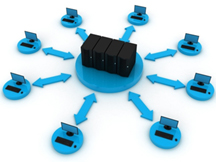Cloud-based Vehicle Tracking On The Way
 When an aircraft crashes, investigators are able to retrieve useful information about what went wrong from the flight data recorder, more commonly known as the black box. (The data recorder itself is actually not black, not until it’s retrieved from charred remains.) Statistically speaking, plane crashes are rare occurrences compared to car crashes, so why not install a black box for cars?
When an aircraft crashes, investigators are able to retrieve useful information about what went wrong from the flight data recorder, more commonly known as the black box. (The data recorder itself is actually not black, not until it’s retrieved from charred remains.) Statistically speaking, plane crashes are rare occurrences compared to car crashes, so why not install a black box for cars?
That’s exactly what Japanese telemetrics company Crew Systems developed: a driving data recorder for cars and trucks. A big market exists for these in Japan, since businesses with more than five vehicles are required by law to produce daily reports on the driving habits of their drivers.
Crew devised a system that includes a video camera that can record data about driver behavior and GPS location. It captures video and audio of accidents in real-time. All of this data is streamed to a server in the cloud where it can assess the data and pump out records of safe driving rankings. Its use is not limited to accidents, since it also highlights unsafe driving practices. You can imagine parents demanding that these smart cameras be installed on school buses.
Many cities use video images to capture traffic accidents at intersections and these are increasingly being used as evidence in legal cases and for insurance claims. But the admissibility of such data as legal evidence requires proof that the data is tamper-free.
For Crew, the missing piece of the jigsaw was being able to prove the integrity of their data for admissibility in court actions. They needed a way to guarantee that the data had not been fooled with, a way to trace and time-stamp the car’s black box as the data was transferred to the cloud. So the company teamed up with GuardTime, which has a mathematically based keyless signature (in defiance of, and to segregate itself away from public key infrastructure, or PKI).
Symon Blomfield, Founder of Presense Networks, says, "GuardTime doesn’t use cryptographic keys. Key infrastructure does not work in a cloud environment where the operator can access the computer memory in which the keys are stored. Without having to deal with key management the integration becomes a simple coding exercise. As GuardTime reduces the cost and hassle to a fraction of competing solutions the question becomes: why would you not sign all your data?"
The algorithms under the hood are complex, but the application is applied simply. In brief, GuardTime’s local client timestamps each file or document giving it a unique signature which can be verified against a publicly available string or code. There’s no need to trust a third-party service or ensure that secret keys are securely stored. It can also be used to verify the integrity of anything digital, whether emails, documents, or a whole batch of files.
By signing all of the digital data collected with keyless signatures, Crew can provide proof that the data has not been tampered with in any way since it was signed, regardless of how it is transmitted and stored in the cloud.
The combination of a cloud service and verification that does not involve sharing data has allowed Crew a true bumper-to-bumper insurance policy.
Several thousand of these drive recorders have been sold mainly to daycare centers, construction, and logistics companies. The company is projecting sales of over 10,000 units per year to industrial waste disposal operators, companies leading reconstruction projects in disaster-stricken areas, and enterprises with large vehicle fleets. This forecast holds not only for Japan, but also within markets overseas.
Drive recorders enable companies to take more responsibility for driving safety and comply with increasingly stringent laws. GuardTime ensures that the data is reliable and credible. Who would have thought that the cloud could lead to this kind of innovation, where company trucks are beaming information about a driver and how this can lead to safer roads for all of us.
 When an aircraft crashes, investigators are able to retrieve useful information about what went wrong from the flight data recorder, more commonly known as the black box. (The data recorder itself is actually not black, not until it’s retrieved from charred remains.) Statistically speaking, plane crashes are rare occurrences compared to car crashes, so why not install a black box for cars?
When an aircraft crashes, investigators are able to retrieve useful information about what went wrong from the flight data recorder, more commonly known as the black box. (The data recorder itself is actually not black, not until it’s retrieved from charred remains.) Statistically speaking, plane crashes are rare occurrences compared to car crashes, so why not install a black box for cars?